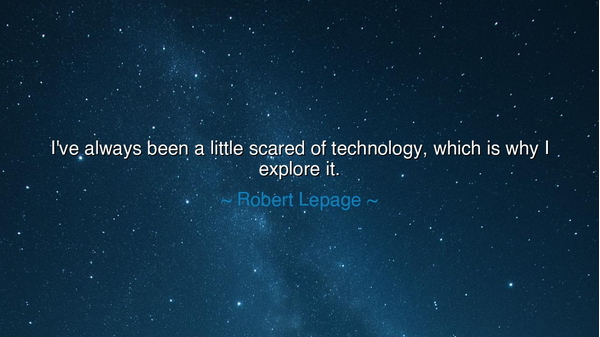
I've always been a little scared of technology, which is why I






Hear the words of Robert Lepage, artist and visionary: “I’ve always been a little scared of technology, which is why I explore it.” In this confession shines a paradox that is as old as human striving: that what we fear most often becomes the very thing we must approach, for within fear lies the key to growth. Lepage does not flee from his unease; rather, he walks toward it, knowing that only in the exploration of what frightens us do we discover its true power and our own hidden strength.
Technology is a force that inspires both awe and dread. From the earliest fires stolen by Prometheus to the machines that now govern our daily lives, humanity has stood both amazed and afraid of what it has created. To be scared of technology is to acknowledge its double-edged nature—it can liberate or enslave, heal or harm, unite or divide. Lepage’s wisdom is that fear itself is not the enemy; it is a compass pointing to the frontier of what we must understand. To explore technology is to strip away illusion and learn how to harness its power, rather than remain a prisoner to ignorance.
History offers us many such lessons. Consider Galileo, who feared the wrath of the Church when he peered through his telescope and discovered the moons of Jupiter. He knew that his findings would challenge the accepted order, and the fear was real. Yet he explored, pressing into the unknown, and in so doing, he reshaped humanity’s understanding of the cosmos. His fear was not a barrier but a doorway to truth. Lepage echoes this ancient pattern: fear is not the end, but the beginning of discovery.
So too, think of the sailors of Portugal and Spain who faced the uncharted oceans in the fifteenth century. Many were scared of sea monsters, of falling off the edge of the world, of storms and endless horizons. Yet their very fear became the reason they explored, and their explorations unveiled new worlds, altered commerce, and rewrote history. Fear pushed them to courage, and courage gave birth to expansion and knowledge.
In the same way, Lepage confronts the dazzling, sometimes intimidating realm of modern technology in his art. His theatre and performances fuse machines, screens, and digital wonders with human imagination. By exploring what unsettles him, he transforms his fear into creation, and his unease into beauty. This is a lesson for all: that what frightens us may conceal our greatest source of inspiration.
The deeper meaning of Lepage’s words is that growth is always found at the edge of fear. If we only remain with what comforts us, we stagnate. If we avoid what unsettles us, we are ruled by shadows of our own making. But if we move toward our fears—not recklessly, but with courage and curiosity—we gain mastery over them. Fear, when faced, becomes fuel; and the unknown, once explored, becomes a realm of possibility.
The lesson, then, is clear: do not run from what you fear. If technology unsettles you, learn it. If change frightens you, embrace it. If challenge intimidates you, confront it. In every age, the ones who grow are those who walk into the unknown rather than shrink from it. For fear is the guardian of wisdom, and only by passing through it can we reach the treasures it conceals.
So let these words of Robert Lepage be engraved in your heart: “I’ve always been a little scared of technology, which is why I explore it.” Let this be your compass in life. Whatever you fear—be it failure, change, or the tools of the new age—walk toward it with steady courage. For in the exploration of fear lies mastery, and in mastery lies freedom.






AAdministratorAdministrator
Welcome, honored guests. Please leave a comment, we will respond soon